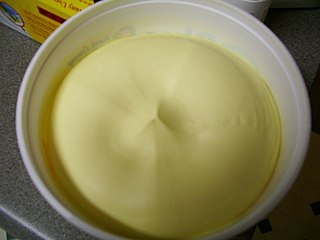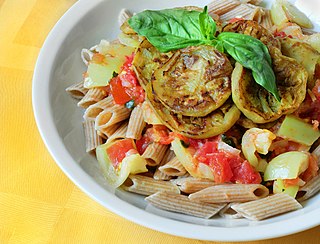Related Research Articles

In nutrition, biology, and chemistry, fat usually means any ester of fatty acids, or a mixture of such compounds, most commonly those that occur in living beings or in food.

Dietary fiber or roughage is the portion of plant-derived food that cannot be completely broken down by human digestive enzymes. Dietary fibers are diverse in chemical composition and can be grouped generally by their solubility, viscosity and fermentability which affect how fibers are processed in the body. Dietary fiber has two main subtypes: soluble fiber and insoluble fiber which are components of plant-based foods such as legumes, whole grains, cereals, vegetables, fruits, and nuts or seeds. A diet high in regular fiber consumption is generally associated with supporting health and lowering the risk of several diseases. Dietary fiber consists of non-starch polysaccharides and other plant components such as cellulose, resistant starch, resistant dextrins, inulin, lignins, chitins, pectins, beta-glucans, and oligosaccharides.

A dietary supplement is a manufactured product intended to supplement a person's diet by taking a pill, capsule, tablet, powder, or liquid. A supplement can provide nutrients either extracted from food sources, or that are synthetic. The classes of nutrient compounds in supplements include vitamins, minerals, fiber, fatty acids, and amino acids. Dietary supplements can also contain substances that have not been confirmed as being essential to life, and so are not nutrients per se, but are marketed as having a beneficial biological effect, such as plant pigments or polyphenols. Animals can also be a source of supplement ingredients, such as collagen from chickens or fish for example. These are also sold individually and in combination, and may be combined with nutrient ingredients. The European Commission has also established harmonized rules to help insure that food supplements are safe and appropriately labeled.

Margarine is a spread used for flavoring, baking, and cooking. It is most often used as a substitute for butter. Although originally made from animal fats, most margarine consumed today is made from vegetable oil. The spread was originally named oleomargarine from Latin for oleum and Greek margarite. The name was later shortened to margarine.

Olestra is a fat substitute food additive that adds no metabolizable calories to products. It has been used in the preparation of otherwise high-fat foods, thereby lowering or eliminating their fat content.

Low-carbohydrate diets restrict carbohydrate consumption relative to the average diet. Foods high in carbohydrates are limited, and replaced with foods containing a higher percentage of fat and protein, as well as low carbohydrate foods.

The Weston A. Price Foundation (WAPF), co-founded in 1999 by Sally Fallon (Morell) and nutritionist Mary G. Enig, is a U.S. 501(c)(3) nonprofit organization dedicated to "restoring nutrient-dense foods to the American diet through education, research and activism".
The Physicians Committee for Responsible Medicine (PCRM) is a non-profit research and advocacy organization based in Washington, D.C. According to Charity Navigator, the organization works for "compassionate and effective medical practice, research, and health promotion."
Hijiki, sometimes called hiziki, is a brown sea vegetable that grows wild on the rocky coastlines of East Asia.

Cat food is food specifically formulated and designed for consumption by cats. As obligate carnivores, cats have specific requirements for their dietary nutrients, namely nutrients found only in meat or synthesised, such as taurine and Vitamin A. Certain nutrients, including many vitamins and amino acids, are degraded by the temperatures, pressures and chemical treatments used during manufacture, and hence must be added after manufacture to avoid nutritional deficiency. Cat food is typically sold as dry kibble, or as wet food in cans and pouches.

Glucomannan is a water-soluble polysaccharide that is considered a dietary fiber. It is a hemicellulose component in the cell walls of some plant species. Glucomannan is a food additive used as an emulsifier and thickener. It is a major source of mannan oligosaccharide (MOS) found in nature, the other being galactomannan, which is insoluble.

A milk substitute is any substance that resembles milk and can be used in the same ways as milk. Such substances may be variously known as non-dairy beverage, nut milk, grain milk, legume milk, mock milk and alternative milk.

Diet food refers to any food or beverage whose recipe is altered to reduce fat, carbohydrates, and/or sugar in order to make it part of a weight loss program or diet. Such foods are usually intended to assist in weight loss or a change in body type, although bodybuilding supplements are designed to increase weight.
A fat substitute is a food product with the same functions, stability, physical, and chemical characteristics as regular fat, with fewer calories per gram than fat. They are utilized in the production of low fat and low calorie foods.
A diabetic diet is a diet that is used by people with diabetes mellitus or high blood sugar to minimize symptoms and dangerous complications of long-term elevations in blood sugar.
The Dietary Approaches to Stop Hypertension or the DASH diet is a diet to control hypertension promoted by the U.S.-based National Heart, Lung, and Blood Institute, part of the National Institutes of Health (NIH), an agency of the United States Department of Health and Human Services. The DASH diet is rich in fruits, vegetables, whole grains, and low-fat dairy foods. It includes meat, fish, poultry, nuts, and beans, and is limited in sugar-sweetened foods and beverages, red meat, and added fats. In addition to its effect on blood pressure, it is designed to be a well-balanced approach to eating for the general public. DASH is recommended by the United States Department of Agriculture (USDA) as a healthy eating plan. The DASH diet is one of three healthy diets recommended in the 2015–20 U.S. Dietary Guidelines, which also include the Mediterranean diet and a vegetarian diet. The American Heart Association (AHA) considers the DASH diet "specific and well-documented across age, sex and ethnically diverse groups."

Hoodia gordonii, also known as Bushman’s hat, is a leafless spiny succulent plant supposed to have therapeutic properties in folk medicine. It grows naturally in Botswana, South Africa and Namibia. The species became internationally known and threatened by collectors, after a marketing campaign falsely claimed that it was an appetite suppressant for weight loss. The flowers smell like rotten meat and are pollinated mainly by flies. The indigenous San people of the Namib desert call this plant ǁhoba.

The Western pattern diet is a modern dietary pattern that is generally characterized by high intakes of pre-packaged foods, refined grains, red meat, processed meat, high-sugar drinks, candy and sweets, fried foods, industrially produced animal products, butter and other high-fat dairy products, eggs, potatoes, corn, and low intakes of fruits, vegetables, whole grains, pasture-raised animal products, fish, nuts, and seeds.

John A. McDougall was an American physician and author. He wrote a number of diet books advocating the consumption of a low-fat vegan diet based on starchy foods and vegetables.

Trans fat, also called trans-unsaturated fatty acids, or trans fatty acids, is a type of unsaturated fat that occurs in foods. Trace concentrations of trans fats occur naturally, but large amounts are found in some processed foods. Since consumption of trans fats is unhealthy, artificial trans fats are highly regulated or banned in many nations. However, they are still widely consumed in developing nations, resulting in hundreds of thousands of deaths each year. The World Health Organization (WHO) had set a goal to make the world free from industrially produced trans fat by the end of 2023. The goal was not met, and the WHO announced another goal "for accelerated action till 2025 to complete this effort" along with associated support on 1 February 2024.
References
- ↑ "Z Trim fat substitute". ConsumerReports.org. Archived from the original on 2007-10-12.
- ↑ "Pittsburgh students bite for 'mystery fat' - Health - Diet and nutrition". NBC News. 18 January 2007. Archived from the original on 2024-03-21.
- ↑ "Kids Loving Healthier Foods At Volusia County Public Schools". EmaxHealth. Archived from the original on 2007-04-29.